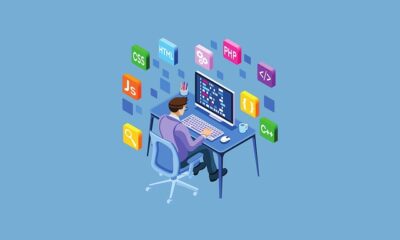Finance
What is Accounting Software and its features, benefits, and disadvantages?

Accounting software is a computer programme that helps bookkeepers and accountants perform financial activities such as accounts receivable and payable, invoicing, tax compliance, general ledger, cash flow analysis, trial balance, income and expense statements, balance sheets, and payroll. With the reports created, a company may see how they function financially and plan for the future.
Accounting software makes it possible to execute financial transactions effectively and in an effective and timely manner. Process automation reduces personnel expenses for people otherwise involved in the manual data processing. Human accounting mistakes are also decreasing. Records are automatically updated.
Larger companies may invest in more specialized accounting software that can process massive volumes of data from several divisions.
Smaller enterprises and self-employed individuals may require more basic software that prioritizes ease of use over-complicated payment processing tools and fancy app connections.
What are the features of accounting software?
Payroll: Manages all of the company’s data about employee payments. Income, deductions, income tax, overtime computations, leave, and producing pay slips are all part of this.
Invoicing and billing: manages invoice creation and provides payment reminders to consumers.
Bookkeeping: Bookkeeping is the process of reconciling sales and purchase ledgers with the general ledger.
Reporting: Reports such as income statements, cash flow statements, balance sheets, and trial balances assist in demonstrating a company’s financial status.
Project accounting: is typically implemented as a separate system that reflects the accounting version of industrial software. Construction operators and software developers will benefit the most from them, given costs and associated rules differ from project to project.
What are the benefits of accounting software?
Accounting software benefits include simple and fast data entry capabilities, improved accuracy due to reduced human error, improved collaboration between departments via a centralized database, reduced operational costs through the elimination of bookkeeping outsourcing, simplified tax compliance, software that can be customized to handle local tax codes, and many more.
Easy to use: Accounting operations and computations are anything but simple; consequently, your new accounting software should at the very least present you with an intuitive working environment. This implies that data should be well-organized and that all features should be available from a single dashboard.
Security: Accounting systems, as previously said, center on a company’s most sensitive data, specifically the statistics on which it relies. Choose a reputable service and thoroughly investigate security aspects beforehand.
Mobile Usability: Mobile-ready accounting solutions are no longer a luxury reserved for large corporations. Most well-known organizations now supply their consumers with native Android and iOS applications that are functionally virtually identical to the desktop version of the system.
Pricing: Pricing may be applied using software logic: the more a system can do, the more it costs; thus, if you can afford a full-featured, sophisticated suite, go for it! However, you should be aware that excellent accounting systems may be obtained for a fraction of the price, and some are even free.
What are the disadvantages of accounting software?
- For certain organizations, the initial expenses of setup might be prohibitively expensive, including purchase, relocation, and training.
- Accounting software must be updated regularly to adjust to changing company procedures.
- Any possible loss of accounting data might bring an organization to a halt.
- If data input mistakes occur, incorrect financial reporting may result.
- Accounting staff may commit fraud by changing data.
Conclusion
Accounting software is a computer application that assists accountants in documenting and reporting a company’s financial activities. Deploying accounting software in your company may be a significant investment; be intelligent and investigate its benefits, features, competency, potential drawbacks, and organizational needs.
OVERVIEW
The Bookkeeping certificate program expands opportunities for individuals pursuing a career in bookkeeping. The program will provide the student with the skills and knowledge required to set up and maintain a complete set of books for a small to medium-sized business. The required courses provide a thorough understanding of the technical knowledge and applications of general bookkeeping principles. Students progress through introductory, intermediate, and advanced levels of bookkeeping
-
Blog1 year ago
MyCSULB: Login to CSULB Student and Employee Portal – MyCSULB 2023
-
Android App3 years ago
Cqatest App What is It
-
Android1 year ago
What Is content://com.android.browser.home/ All About in 2023? Set Up content com android browser home
-
Software2 years ago
A Guide For Better Cybersecurity & Data Protection For Your Devices
-
Latest News2 years ago
Soap2day Similar Sites And Alternatives To Watch Free Movies
-
Android2 years ago
What is OMACP And How To Remove It? Easy Guide OMACP 2022
-
Android3 years ago
What is org.codeaurora.snapcam?
-
Business2 years ago
Know Your Business (KYB) Process – Critical Component For Partnerships

































